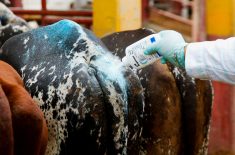Aid to livestock producers, investment in hog processing capacity and a strategy to deal with U.S. country-of-origin labeling (COOL) will take part of Manitoba’s share of federal Community Development Trust funding.
Federal Finance Minister Jim Flaherty came to Winnipeg Thursday to announce the province will get $41.9 million from the program, which splits up $1 billion from the projected 2007-08 budget surplus among participating provinces over a three-year period.
The Conservative government put up the trust in January as an aid package for communities and workers “suffering economic hardship caused by the current volatility in global financial and commodities markets.” The government expected so-called “one-industry” towns facing major downturns and high unemployment to be major beneficiaries of the funding.
Read Also

U.S. not ready to lift Mexican cattle ban over screwworm, Agriculture Secretary Rollins says
The U.S. is not yet ready to reopen its border to Mexican cattle amid an outbreak of the flesh-eating New World screwworm parasite, Agriculture Secretary Brooke Rollins said, but she is pleased with Mexico’s efforts to contain the pest.
Provinces that sign on for Community Development Trust funds get a minimum $10 million with more to be allocated on a per-capita basis. Other participating provinces have pledged the funds to communities hit hard, for example, by downturns in the forestry sector.
Among Manitoba’s priorities, announced Thursday by Premier Gary Doer during Flaherty’s news conference at Winnipeg’s Palliser Furniture plant, are aid to livestock producers, a strategy to deal with COOL’s “potential” impact, and “investment in infrastructure and training to support increased hog processing capacity within Manitoba.”
It’s expected that the province will soon offer specific details on some allocations from this funding. Press conferences have been scheduled for Friday in Brandon, home of Maple Leaf Foods’ primary pork processing plant, and in Neepawa, home of hog producer Hytek’s Springhill Farms pork plant.
The U.S. government plans to implement mandatory COOL for that country’s imports of beef and many other meat products starting in September this year, as per Washington’s 2002 Farm Bill. It’s feared U.S. packers may shun the expense of adapting their systems to label imported meat, and that they may reduce or end their imports of Canadian product instead.
Livestock producers in Manitoba and elsewhere in Canada currently face a triple whammy of low returns, high feed costs and a high Canadian dollar. The federal government recently broadened its Advance Payments Program for livestock producers and announced a $50 million cull to scale back the size of Canada’s swine breeding herd by 10 per cent.
The province said it will also use part of the federal money for support and training in northern and Aboriginal communities “to address challenges and opportunities in resource-based economies,” as well as to “help address the consequences of challenges, including the high Canadian dollar, faced by manufacturers and exporters.”
The province said it has agreed to respect Canada’s obligations under the North American Free Trade Agreement, the Canada-United States Softwood Lumber Agreement and the World Trade Organization in sharing its portion of the communities funding.










